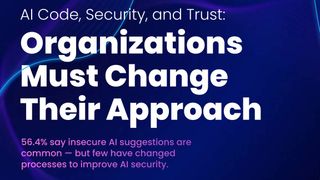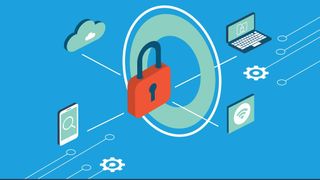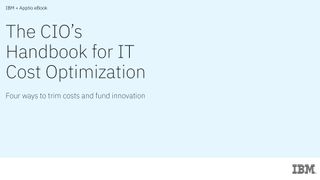What is cyber security?
To learn what cyber security is, you also have to know what it's not

Gone are the days where hearing a story about how a major international conglomerate lost millions of its customers' personal data through a data breach shocked us. Cyber attacks are no longer an abstract evil to which only the unlucky few became victims - they're everywhere now and seen, by and large, as an inevitability.
That's not to say cyber attacks have become inherently less scary, the likes of NotPetya and WannaCry may be things of the past but devilish malware is still found in the wild, tearing up systems worldwide. As the value of data increases, so does the demand for it which means businesses must keep iron-clad cyber defences if they want to avoid the debilitating GDPR fines that have already hit the tech giants.
Hacked Texas government agencies face $2.5 million ransom Are we in the midst of a cyber war? General Data Protection Regulation (GDPR)
But it isn't just the tech industry's heavy hitters that are subject to GDPR's fines, the UK's data protection watchdog is also known to come after the smallest companies for what might seem to some as small offences. With so much emerging technology being made available to businesses undertaking ambitious digital transformation projects, it's important to make security at the core of everything you do. Getting swept up in the thrill of AI and cloud computing is no excuse not to keep those endpoints secure and the SOC well-trained.
What cyber security isn't
When designing and implementing a cyber security strategy in an organisation, it's essential to establish first what it should and should not include. This is particularly important for smaller businesses where there are greater strains on available budgets and where skills may be in short supply.
Any strategy needs to make the most important business issues a primary focus, ensuring that nothing critical is overlooked. Cyber security will integrate and overlap with other areas of the business, but these blurred lines can often distract from the primary concern of the strategy.
This often comes up when businesses are assessing their data protection policies alongside cyber security. Although it's easy to conflate security and privacy, these two areas are distinctly different - putting up iron bars on a window is great for security but does nothing for privacy, while a curtain will have the opposite effect. Security policies should only focus on security, and leave privacy to a different strategy.
Cyber security is also often conflated with data backups. Having a good backup and disaster recovery strategy in place is essential for any business, however, it's no substitute for having robust security safeguards in place - particularly if your backups get wiped as part of an attack.
Get the ITPro. daily newsletter
Receive our latest news, industry updates, featured resources and more. Sign up today to receive our FREE report on AI cyber crime & security - newly updated for 2024.
What cyber security is
OK, so what is cyber security then? The simplest definition comes by way of comparing and contrasting with information security: whereas information security is the protection of your data from any unauthorised access, cyber security is protecting it from unauthorised online access.
That was the simple definition, but for a more formal and comprehensive alternative you'd be hard-pressed to better the International Telecommunications Union (ITU) official take: "Cybersecurity is the collection of tools, policies, security concepts, security safeguards, guidelines, risk management approaches, actions, training, best practices, assurance and technologies that can be used to protect the cyber environment and organization and user's assets."
Cyber security is a process
Cyber security is not merely finding a solution to a specific problem, or indeed the problem itself. Cyber security is the process through which your business should go through in order to protect itself against evolving threats. This does include the tools and technologies needed to fight security threats, and also to maintain compliance, but it also includes the processes that everyone in your organisation should adhere to in order to make sure nothing slips through the cracks.
This means that your cyber security measures are something you should be constantly evaluating and updating accordingly. In terms of security hardware and software, this means investing in technology you trust and you know will be updated to respond to the latest threats and advances in security technology. For example, an OS that is supported and regularly patched, devices with the latest in endpoint security built in, or cloud-based services which are constantly updated.

Simplify cluster security at scale
Centralised secrets management across hybrid, multi-cloud environments
This process is also as much about making sure everybody in the business is up to speed with their role in keeping your organisation safe online as it is about keeping security technology running effectively. It’s no good having stellar endpoint security on company-issued devices if your staff are just going to use their own inadequately protected devices to access your data. Even if you have anti-virus software or firewalls, you still need to educate your employees to be cautious of things like phishing emails, and inform them of new threats as and when they emerge.
This year, in particular, has proved how crucial it is for companies to view security as an ongoing process rather than take a one-size-fits-all approach. Not only have cyber criminals seen huge potential in the disruption caused by COVID-19, but remote working poses its own huge set of cyber security challenges. Organisations must consider how lack of a centralised network and an inability to monitor of staff activity in the office affects security, and how staff behaviour may change in the home environment.
The bottom line
Keeping cyber security at the heart of everything your business does and what your employees do is of paramount importance. It's not merely another process nor is it something that should simply be tagged on to the end of a businesses growth strategy.
While it's ultimately down to the business' IT team to keep things secure, a company-wide awareness should always be in place – it's everyone's responsibility to safeguard themselves and their system. Whether it's spotting an innocuous-looking phishing email or flagging a crippling form of ransomware, everyone can play a role in protecting what matters most to your business.

Connor Jones has been at the forefront of global cyber security news coverage for the past few years, breaking developments on major stories such as LockBit’s ransomware attack on Royal Mail International, and many others. He has also made sporadic appearances on the ITPro Podcast discussing topics from home desk setups all the way to hacking systems using prosthetic limbs. He has a master’s degree in Magazine Journalism from the University of Sheffield, and has previously written for the likes of Red Bull Esports and UNILAD tech during his career that started in 2015.



